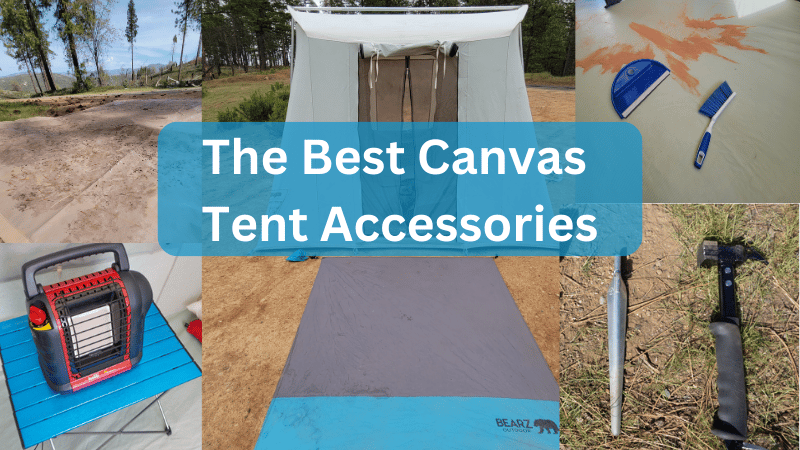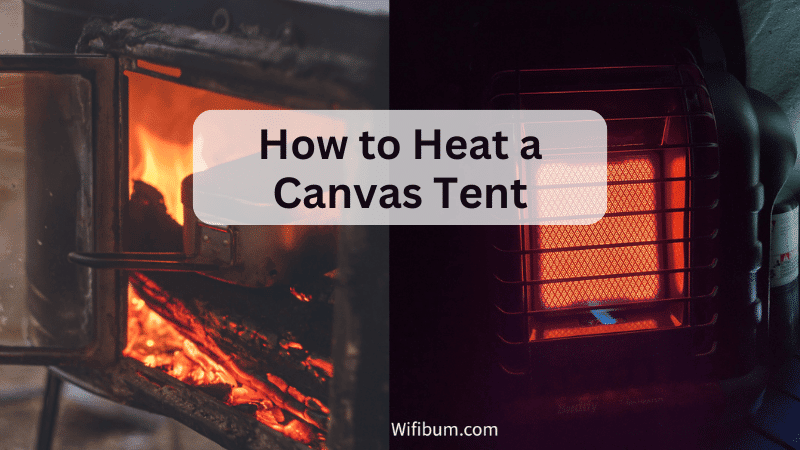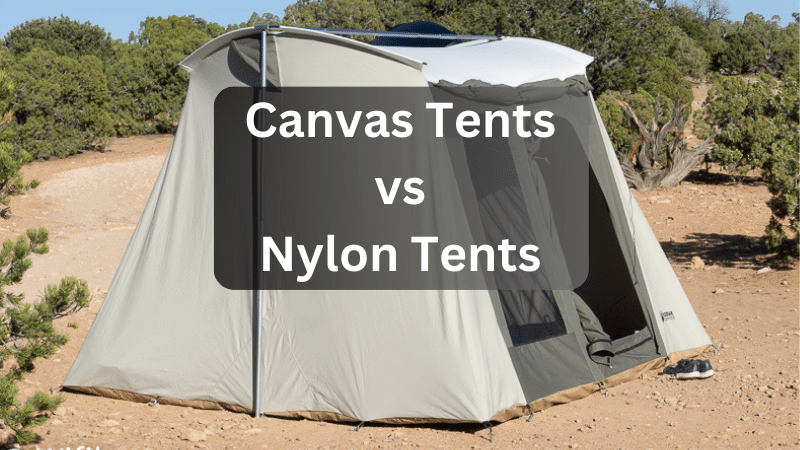Tent locks for camping can deter theft at campgrounds and festivals while also providing peace of mind at night.
A tent lock may seem odd because tents are made of very cut-able materials. Besides a tent lock, I’ll also give you 10 practical tips for keeping your tent and gear safe.
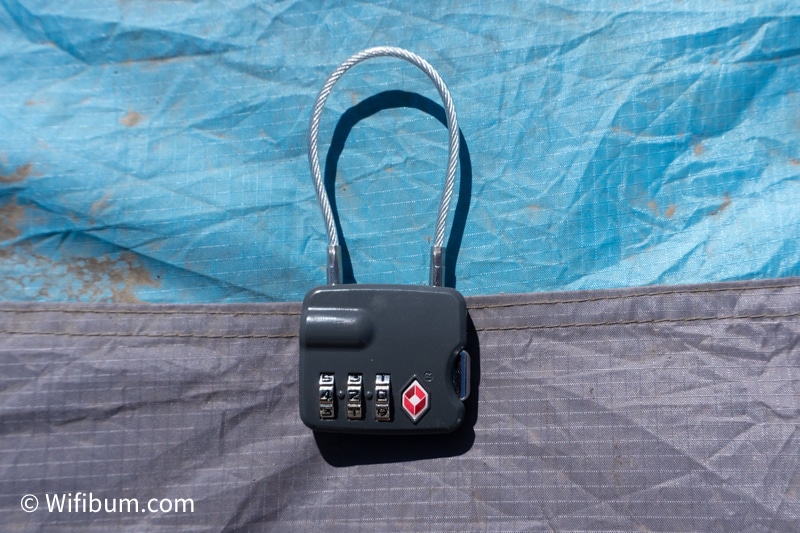
Tent locks also work for locking a tent from the inside while you are sleeping. And they are useful at festivals and other events.
Tent Locks for Camping and Festivals
A tent lock with a flexible cable is the best way for locking a tent. These locks are typically made for luggage like this one.
- Flexible cable
- No keys
- Perfect for tents and luggage
Your tent must have two zippers for it to be effective. I use tent locks for my canvas tent and it actually has three tent zippers.
It’s best to tuck the tent lock into the inside of the tent so it’s not showing to people walking by. Otherwise, locking your tent might draw more attention than if you didn’t have it.
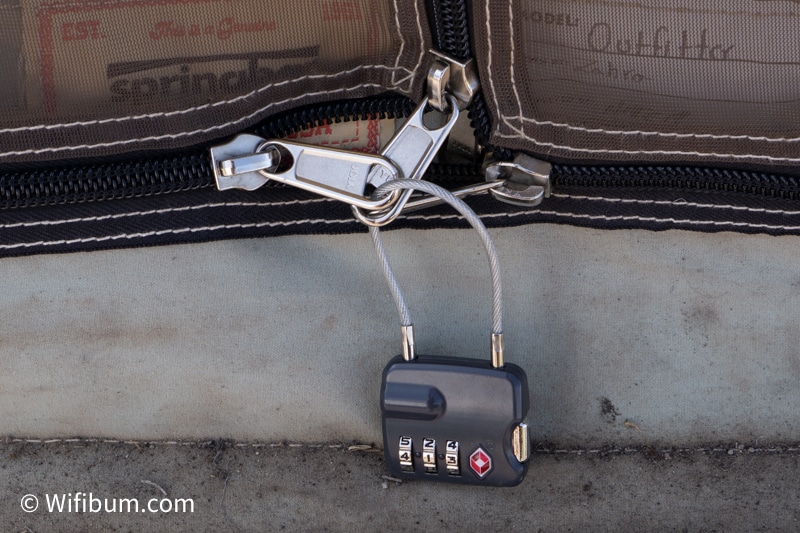
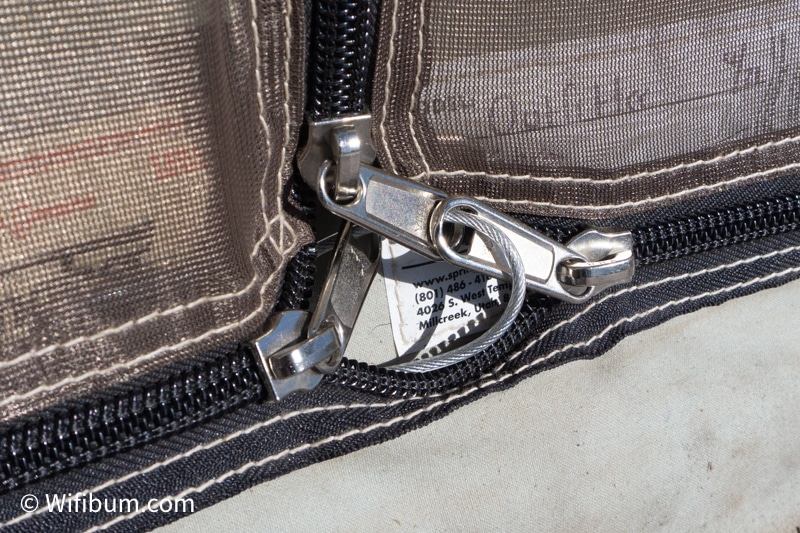
How to Lock a Tent from the Inside
To lock a tent from the inside, close the tent so the zippers are next to each other. Then feed the flexible cable lock through each zipper loop.
Don’t change the lock combination after locking it (ie: so you can just press the button to open it).
Locking a tent from the inside could be dangerous if there is an emergency, so be smart about it. In addition, I wouldn’t recommend a master lock, small padlock, or similar types of locks like some Google results are suggesting. Some recommend using a zip tie to tie the tent zippers together. Most adults can break small ones, or keep a pocket knife nearby.
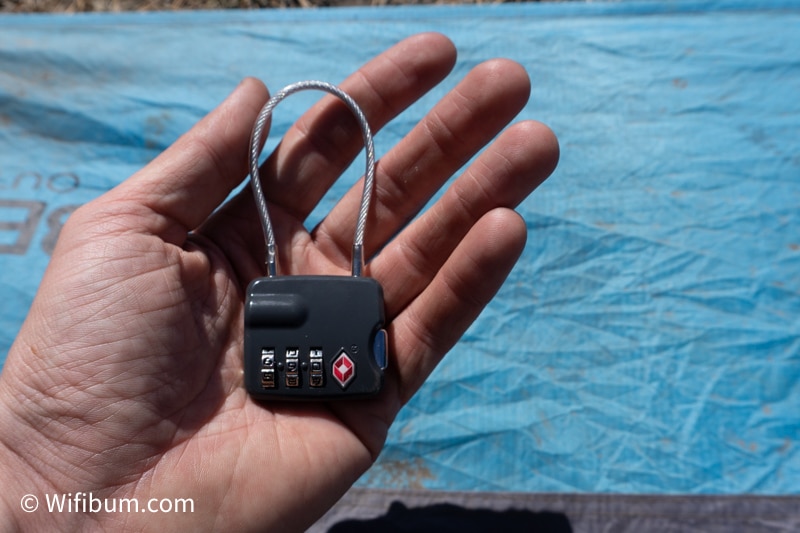
Whether you’re at a festival or on a long camping trip, locking your tent can indeed provide ease of mind and some general sense of security.
Small tent combination locks should be a very small part of your overall camping security. Learning about preventing trailhead theft and portable car safes may also help you come up with a solid plan to keep valuable camping gear safe.
Festivals, Rowdy Campgrounds, and Locking Your Tent
Festivals and busy campgrounds are two events you may want to consider a tent lock.
At a festival, I heard a story of someone having their tent opened in the middle of the night by a stranger. I heard about another time at a campground where you float a river and drink all day.
Neither were done with bad intentions, but alcohol and or drugs can make people forget which tent belongs to them!
Having a festival tent lock would help give you a few moments to recognize someone is messing with your tent. Hopefully, before they are able to drunkenly stumble into the tent.
Best Tent Lock for Camping and Festivals
Luggage locks are the best tent locks for camping and festivals.
These work great for locking a tent because they have flexible cables and are thin enough to fit through the tent zippers of most festival and camping tents.
The best tent locks have flexible cables, no keys, and are easy to use.
This combination lock can be used to lock a tent from the inside while you’re sleeping or from the outside when you’re away from the tent.


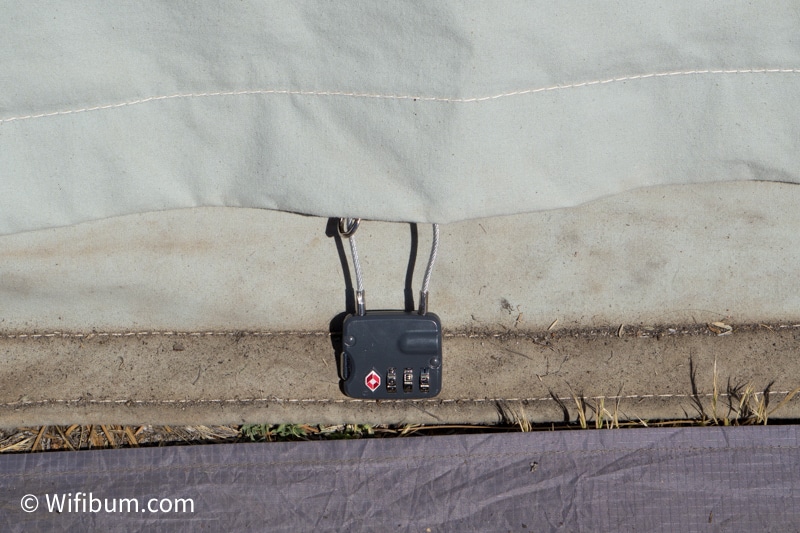
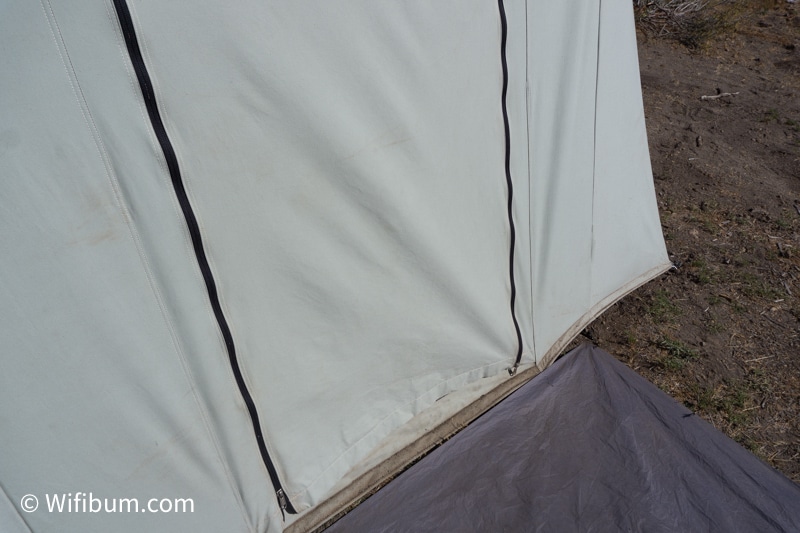
The Role of a Tent Lock: How Does it Help?
Tent locks are a strange idea. Why would you lock something that is made of nylon, canvas, or other very cut-able materials.
Maybe I had a messed up childhood and knew too many shady people. Because one thing I do know about theft is it’s an opportunity business.
The simplest things can be deterrents. One of those is… a lock.
A lock creates a minor inconvenience to a thief is a great way to get them to move onto the next opportunity.
I don’t think it matters which type of lock you use. I use a simple TSA-approved luggage lock I found at Target and was $10.
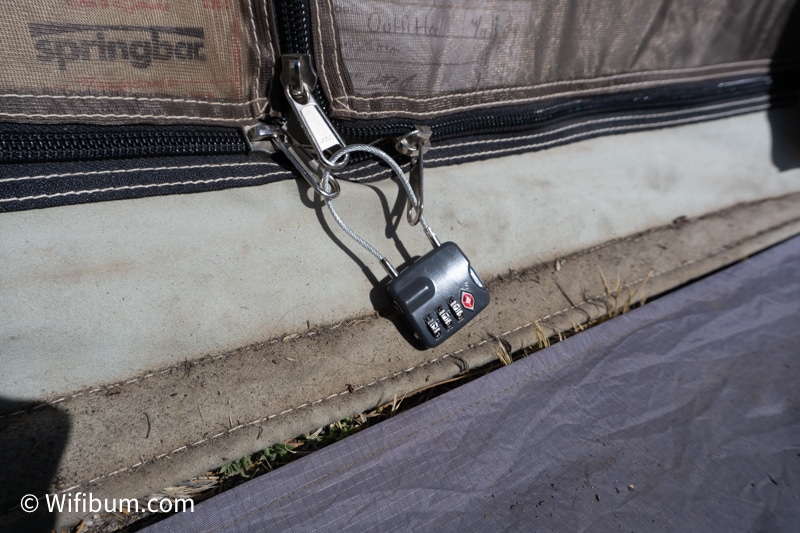
One could argue that locking a tent is pointless. A pocket knife could tear into the fabric and make the lock completely useless.
However, I think there is a big difference in the type of thief that is trying to be opportunistic and quick open a tent near a main road and one that is going to pull out a knife out and cut into the tent.
Just like some thieves will walk by cars jiggling the car handle, but wont smash a window.
It’s not a great analogy. But knowing these type of people growing up, it really can be as simple as that – lock shit up and make it take an extra step to steal your stuff.
In my mind, the more resistance you add to situations and the more you have to make them “think” about what they’re doing, the better.
Camping Safety: Why Use a Tent Lock?
If you have something valuable in your tent, why not simply take it with you wherever you’re going?
That is the correct solution. It’s much harder to break into a vehicle than into a tent.
However, I am still a believer that a $12 tent lock can save a huge headache at some point in your life.
I don’t always lock my tent, but I will in certain situations now after having encountering enough weird situations.
Listen to your spidey sense
It took one weird thing to happen to me where a tent lock and a lockbox for my car are now on my standard packing list.
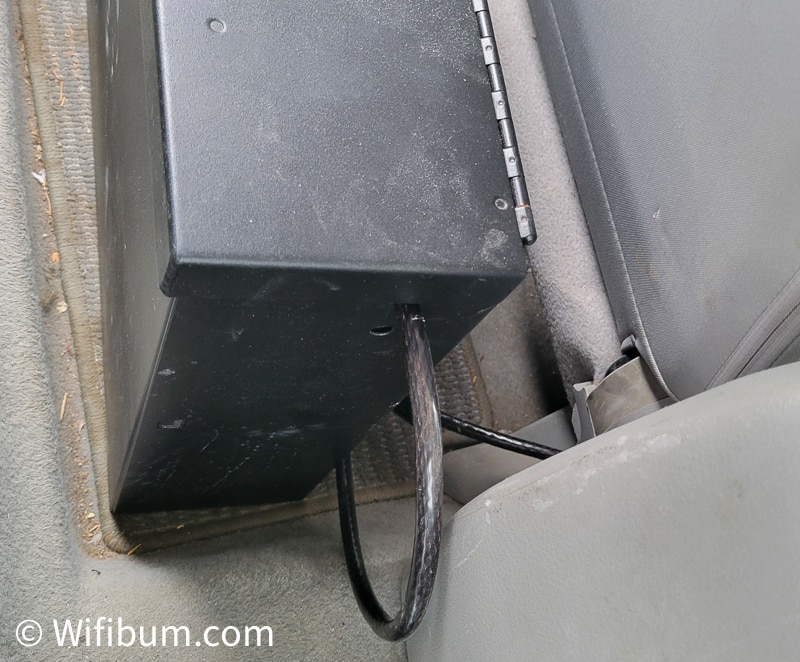
Long story (kinda) short, I was camping in national forest next to a small town and the same vehicle drove by several times in a week. They were blaring music, driving fast and trying to do burnouts, and the final straw was them stopping at my campsite when my trunk was open. As I walked out of my tent after hearing the car stop, the driver and a rough looking friend drove off. It was enough where I felt pretty uncomfortable and moved camps.
The amount of “wtf” moments can start adding up if you camp enough.
Benefits of Locking a Tent
Locking a tent offers “peace of mind” and can potentially prevent tent theft or an unwanted visitor.
I will sometimes lock my tent while I’m gone on a short drive to town or a long hike or bike ride.
This is especially true if I’m brand new to the area and I’m not sure how many people drive by.
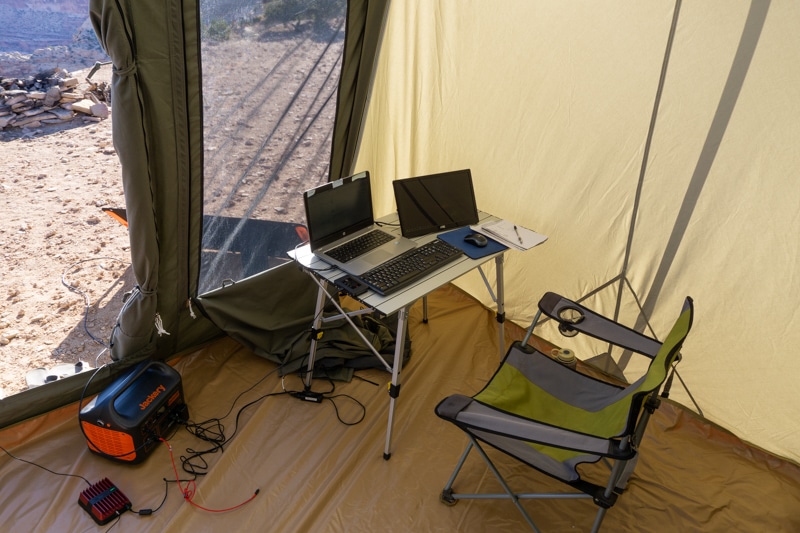
I’m also in a unique situation. Often times I have more gear than the average person would have on a camping trip.
It’s important to note, you should NEVER store laptops, camera gear, or anything like that in my tent while you’re gone. If they want to steal your stinky sleeping bag or gear, then hopefully they needed it more than you.
Using a tent lock can help address some minor anxieties about leaving a few hundred dollars of gear in it. However, common sense will be your best solution in most cases.
Tent Lock Alternatives: 10 Tips for Preventing Camp Theft
An ounce of prevention is worth a pound of cure.
When I lock my tent, it’s the exception to the rule because I probably didn’t follow one of these 10 tips.
Most of these are obvious. Number 5 is where my personal experience comes to play.
1. Use common sense: Take your valuables with you!
There are very few reasons that there should be valuables in your tent.
Your purse, wallet, and similar items should be on your person. Take them with you or see #2.
2. Store Expensive Gear in Your Vehicle
I enjoy going on walks, hikes, runs, and bike rides directly from camp.
When I do this, I make sure to put expensive gear into my vehicle even if I’m only gone for an hour.
Use a portable car safe that can attach to the inside of your vehicle for laptops, mirrorless cameras, and other valuables.
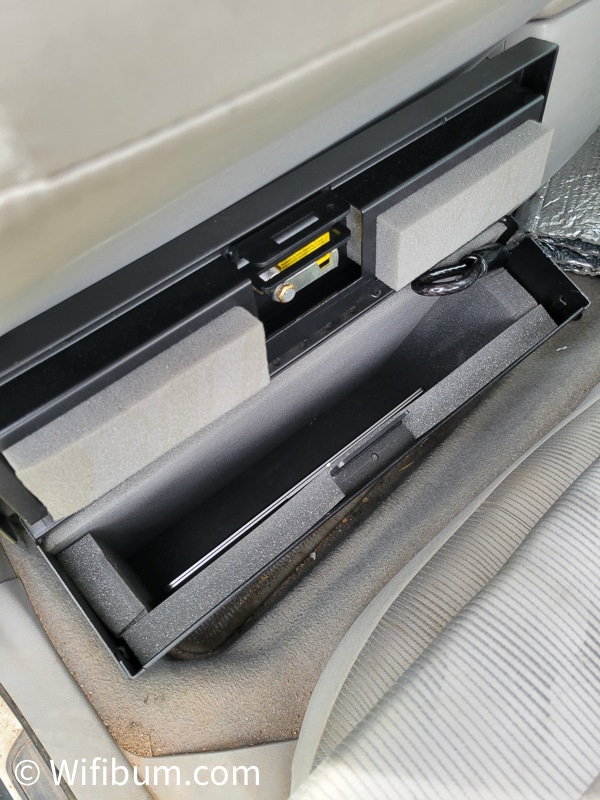
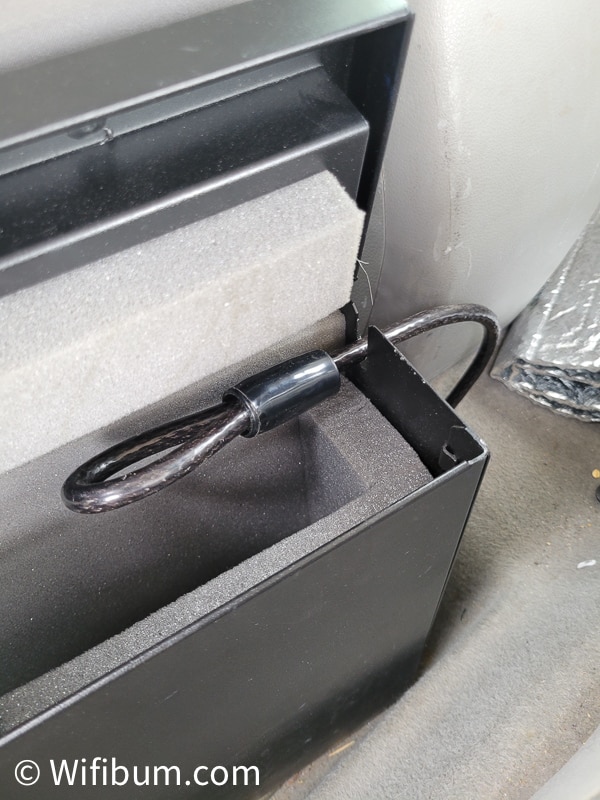

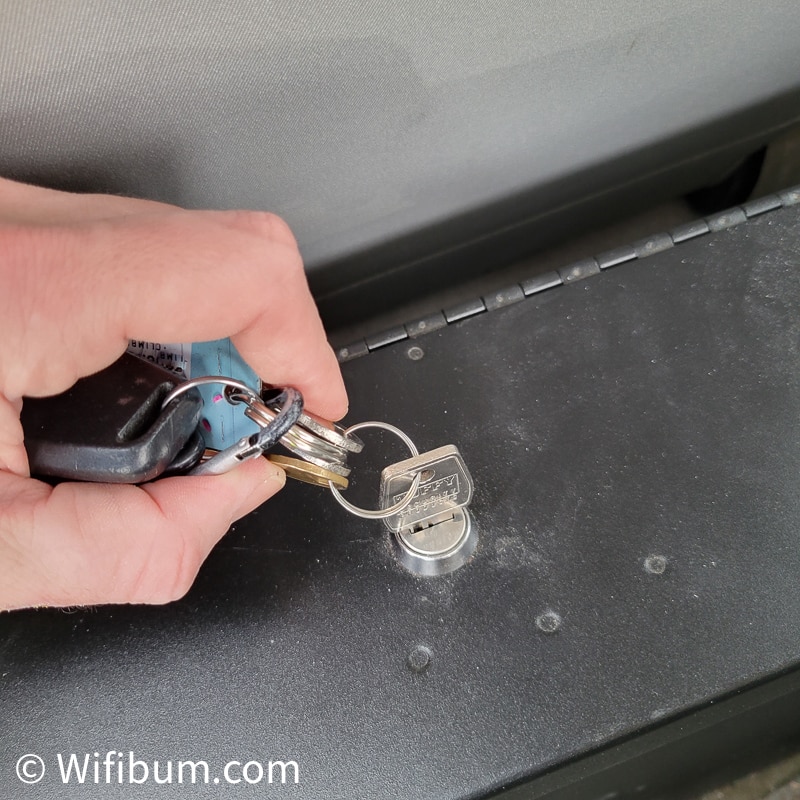
3. Camp in Popular Areas
If you’re in an established campground, I don’t think there is any real risk of someone going into your tent. Most people are good people or will say something if they see something odd in your camp.
The exception would be rowdy camp sites known for drinking.
4. Camp in Secluded Areas
Know who steals gear? People.
Thieves don’t drive hours into national forest hoping to stumble upon your REI 4 person tent.
And, yes, I know 3 and 4 are a contradiction. The WORST type of camping is somewhat remote, but someone decides to car camp wayyyy too close to you and invades your camping bubble.
5. Camp Away from Highways and High Traffic Roads
There are only a few times I’ve felt uncomfortable while camping.
No matter where you are in the U.S., there are more issues the closer you are to cities and towns. In other words, the more people within 15 miles of you, the more weird shit you will encounter.
From teenagers partying and driving in the middle of the night to shady looking locals, you’re bound to have an interesting story if you camp for more than a few nights near major highways or just outside of country towns.
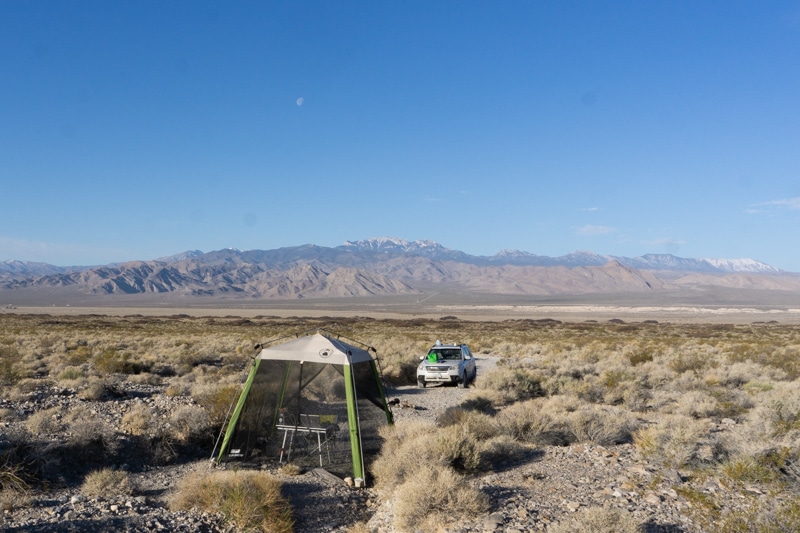
6. Pay Attention to Vehicles Driving By
This goes along with the lesson I learned above. If you start seeing the same vehicle drive by several times a day and something seems off, it may be time to switch camps.
7. Set Up Your Tent Further Away from the Road
As I’ve mentioned, most petty theft is opportunistic. If your tent is several car lengths away from the road, it will stop many people from being interested in it.
8. Keep Expensive Gear Out of Sight and Don’t Bring Unwanted Attention
When I first started working while camping, I basically gave everyone that passed by a glimpse into all the belongings I had in my car.
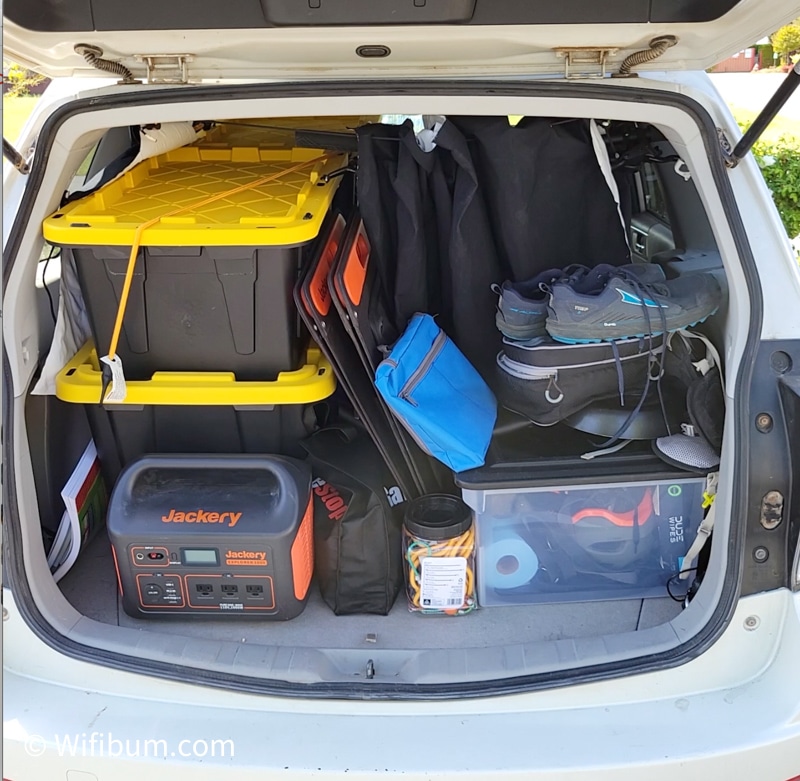
I was using a screen tent where I had an expensive Jackery battery pack and solar panels propped up charging it.
Every person that drove by got a small glimpse into the expensive gear I had with me.

I’m sure it’s similar if you’re a professional photographer. You probably don’t want to be organizing your gear at the picnic table or in the open so that everyone knows what you have.
9. Avoid Camping in Spots with Excessive Trash
It’s a sad reality, but many campsites on public land are treated poorly.
There have been many awesome spots I’ve had to turn away from because of excessive broken glass, random trash, bullet casings, etc.
The more trash around, the more likely there are more people around than you thought, especially on weekends.
10. Get to Know Your Neighbors
If you camp near others, make a point to say hi and make some small chat.
You don’t have to tell them to “watch my camp” – but if you have cool neighbors, the more likely they’ll notice something while you’re gone since they’ll know your face and vehicle.
Conclusion: If You Googled a Tent Lock, Get One
I think it’s as simple as that. If you are at all concerned with tent security, buy a simple lock.
It will give you peace of mind and it may help in the very, very, very small chance of any poor behavior.
- $13.95Get Your Lock
Flexible locking cable
No keys required
2 pack value
Support REAL reviews. I don't accept free gear or use sponsored content. However, I still may earn a commission if you use this link and make ANY purchase at no additional cost to you.
05/29/2025 09:39 pm GMT - $13.49Get Your Lock
- Flexible cable
- No keys
- Perfect for tents and luggage
Support REAL reviews. I don't accept free gear or use sponsored content. However, I still may earn a commission if you use this link and make ANY purchase at no additional cost to you.
05/29/2025 10:34 pm GMT - View Details
A great multi-use lock
No keys required
Support REAL reviews. I don't accept free gear or use sponsored content. However, I still may earn a commission if you use this link and make ANY purchase at no additional cost to you.
Frequently Asked Questions
Is Tent Camping Safe?
In almost every situation, yes.
I grew up camping with my family in established campgrounds. As an adult I continue to go on camping trips, primarily on public lands where it is free to camp and it’s easy to find a safe campsite.
Personally, I have never had any major incidents nor I have I ever had a friend have their tent “broken into” or anything stolen.
However, I have heard MANY stories of vehicles being broken into at trailheads.
Thieves aren’t trying to steal your stinky sleeping bag you haven’t washed in 10 years. And they don’t want to try and resell your sleeping pad.
They want you wallet, purse, camera gear, or other electronics which most people store in their vehicles.
I’m not an expert in the RV or campervan area, but I would assume those types of vehicles and trailers would have to give more thought into this subject.
Related Reading: Portable Car Safes
Related: Avoid Trailhead Theft and Break-Ins




